SUMMARY
This is AI generated summarization, which may have errors. For context, always refer to the full article.
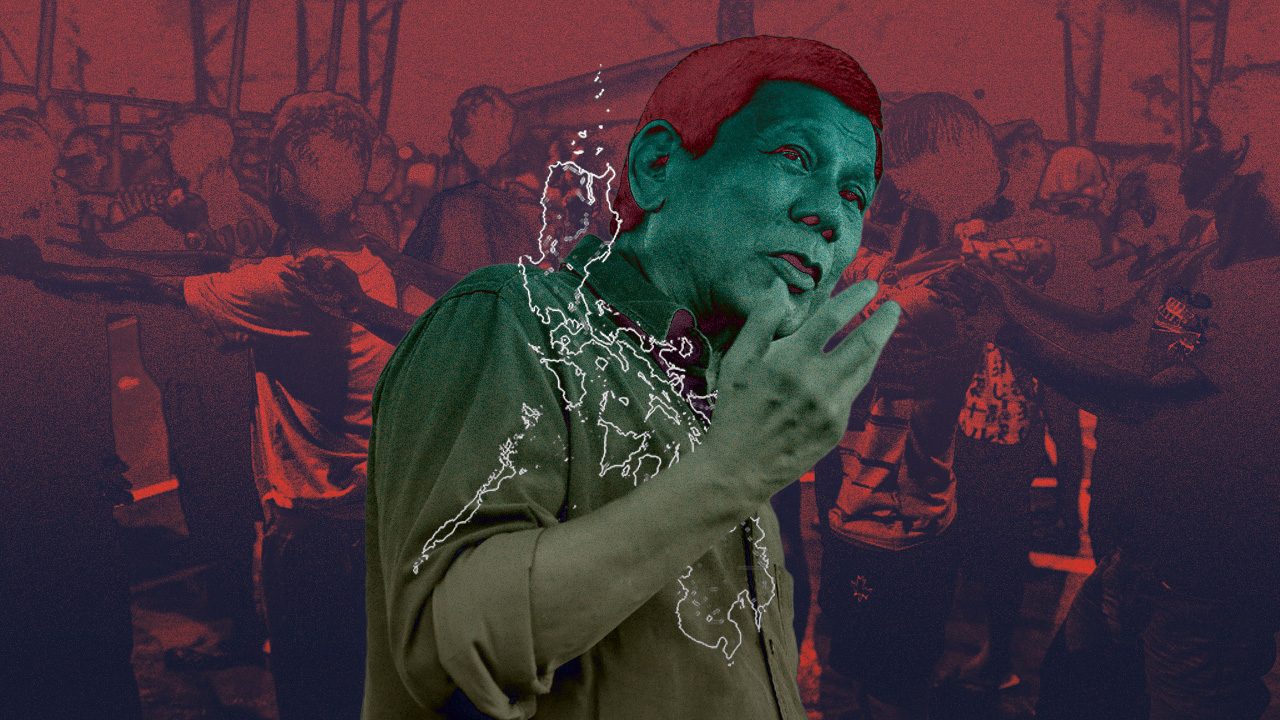
MANILA, Philippines – At the stroke of noon on June 30, 2022, Rodrigo Duterte will cease to be Philippine president, ending a six-year term which saw the passage of key economic reforms, a bloody drug war that horrified the world, blows to democratic institutions and freedoms, and an unprecedented level of presidential popularity amid a highly polarized political environment. (See Rappler’s special coverage assessing Duterte’s presidency here.)

Duterte was a president who rolled up his barong sleeves, chewed gum while meeting with foreign dignitaries, spoke of cold-blooded murder before an audience of Boy Scouts, joked about rape, and kissed a woman full on the lips onstage.
He exits Malacañang at the age of 77. The presidency was the apex of an astonishing 30-year political career in which he won every election he ran in – 10 in total. According to surveys, Duterte is the country’s most popular post-EDSA Revolution president. Pulse Asia president Ronald Holmes says not once did Duterte’s approval ratings dip below majority levels in his entire term.
Yet his popularity came at the cost of weakened democratic institutions, suppressed media, and a climate of fear for dissenting voices.
Rappler looks back at Duterte’s governance style. Here are key aspects of it:
- He appointed based on proximity and loyalty, valuing these above competence or propriety.
- He often made big policy or messaging decisions without first studying the matter or consulting his Cabinet members. It was part of an instinctive, performative style that gave the public an impression of decisive leadership but was a headache for his underlings and spooked the business sector, diplomats, and others.
- He didn’t govern in a general sense but focused on pet issues.
- He was stubborn on his pet issues, but also on punishing his critics and any perceived threat to his presidency.
- He lacked the bandwidth and patience for understanding the nuts and bolts of policy, the nuances of complex problems – and governance suffered for it.
The Davao group in Malacañang
Duterte is no believer of “keep your enemies close.” He surrounded himself with the familiar and trusted, and for many, including those in his inner circle, public service was all the worse for it.
Sensitive positions were given to soldiers and cops he worked with him as Davao City mayor, San Beda fraternity brothers, dorm mates, City Hall staff, personal lawyers, relatives of close family members.
“He would only appoint people whom he knew before and had a track record with him. If you are new [to him], no matter how good you are, you will not get appointed,” said Jesus Dureza, Duterte’s former peace process adviser, in an interview with Rappler.
This did not mean all of Duterte’s appointees were incompetent. Indeed, many in the private sector and civil society are thankful for the likes of Finance Secretary Sonny Dominguez, Presidential Adviser on Flagship Programs and Projects Vince Dizon, Socioeconomic Planning Secretary Karl Chua, Defense Secretary Delfin Lorenzana, Justice Secretary Menardo Guevarra, Trade Secretary Ramon Lopez, and more. Rather, that loyalty and familiarity were often the first consideration.
Some controversial appointees included blogger and disinformation purveyor Mocha Uson as a communications official and later on civil defense official; Nicanor Faeldon even after the shabu smuggling that got past his customs bureau; Dante Gierran, a former cop to lead the state health insurer.
He tended to give retired military or police generals positions that dealt with highly complex and specialized fields. In certain cases, this appointing style did little to help the agency. The prime example would be the appointment of former Armed Forces of the Philippines chief Ricardo Visaya to head the National Irrigation Administration (NIA), an agency bedeviled with performance problems since before Duterte.
Duterte, who sympathized with farmers enough to sign a law exempting the poorest from paying irrigation fees, could have used his term to drastically increase irrigation coverage in the country. But under Visaya, NIA continued to get faulted by the Commission on Audit for measly performance, irregularities in contracts, and delays in projects.
Agriculture Secretary William Dar admitted that he would have wanted an irrigation expert in charge instead. “For me, it should be an expert who will get appointed there because it will take some time to get over the learning curve,” he said in a Rappler Talk interview.
In Malacañang, Duterte retained many career officials in the Presidential Management Staff and the larger Office of the President. But he introduced a layer of Davao lawyers who practically ran the place.
These included Lloyd Christopher Lao (of Pharmally and frigates fame), Anderson Lo, Jennifer Ong, Margarita Yu, and Erwin Enad. All of them were officials under the Office of the Special Assistant to the President (OSAP), the office of Bong Go, Duterte’s most loyal aide.
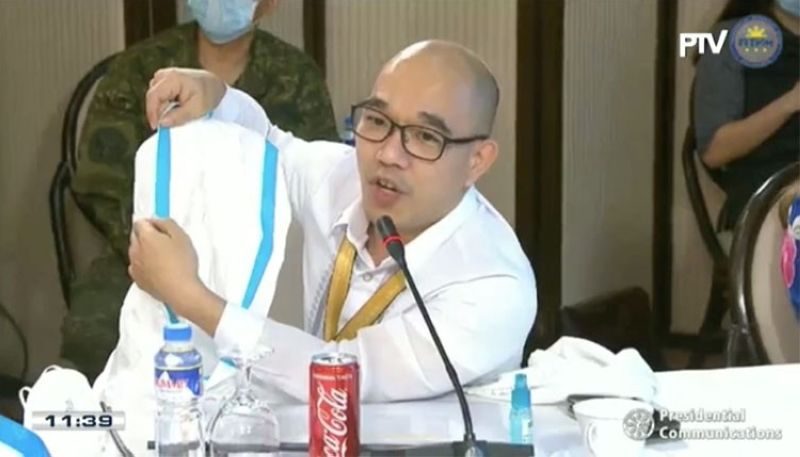
All appointments of government officials went through them. They spread out among themselves all tasks Go needed done – from implementing Duterte’s orders to following up on agencies about pending deliverables.
Most of them would eventually land cushy positions elsewhere in government.
Lao, of course, ended up heading the budget department’s procurement service, after a string of other government posts. Lo is now deputy ombudsman for Mindanao, with oversight over any cases that would be filed against elected Dutertes. Ong is a Court of Appeals justice. Enad is a commissioner at the Professional Regulation Commission.
Act first, clean up later
Presidents before Duterte would typically be on the same page as their advisers and Cabinet members because they almost always needed their report or analyses before pursuing a particular course of action.
Former president Fidel Ramos, for example, was known for requiring complete staff work on a certain matter before he made key decisions.
With Duterte, there were plenty of times this was not the case.
“With President Duterte, it was the opposite. He comes up with a decision, then that’s the only time the staff study will be undertaken to implement what he has already decided upon,” said Eliseo Rio Jr., former acting information communications technology secretary, in an interview with Rappler.
This was the situation when Duterte announced his “economic and military separation” from the United States, the closure of Boracay Island, his arrest order for vaccine refusers, threat to scrap the Visiting Forces Agreement, and more.
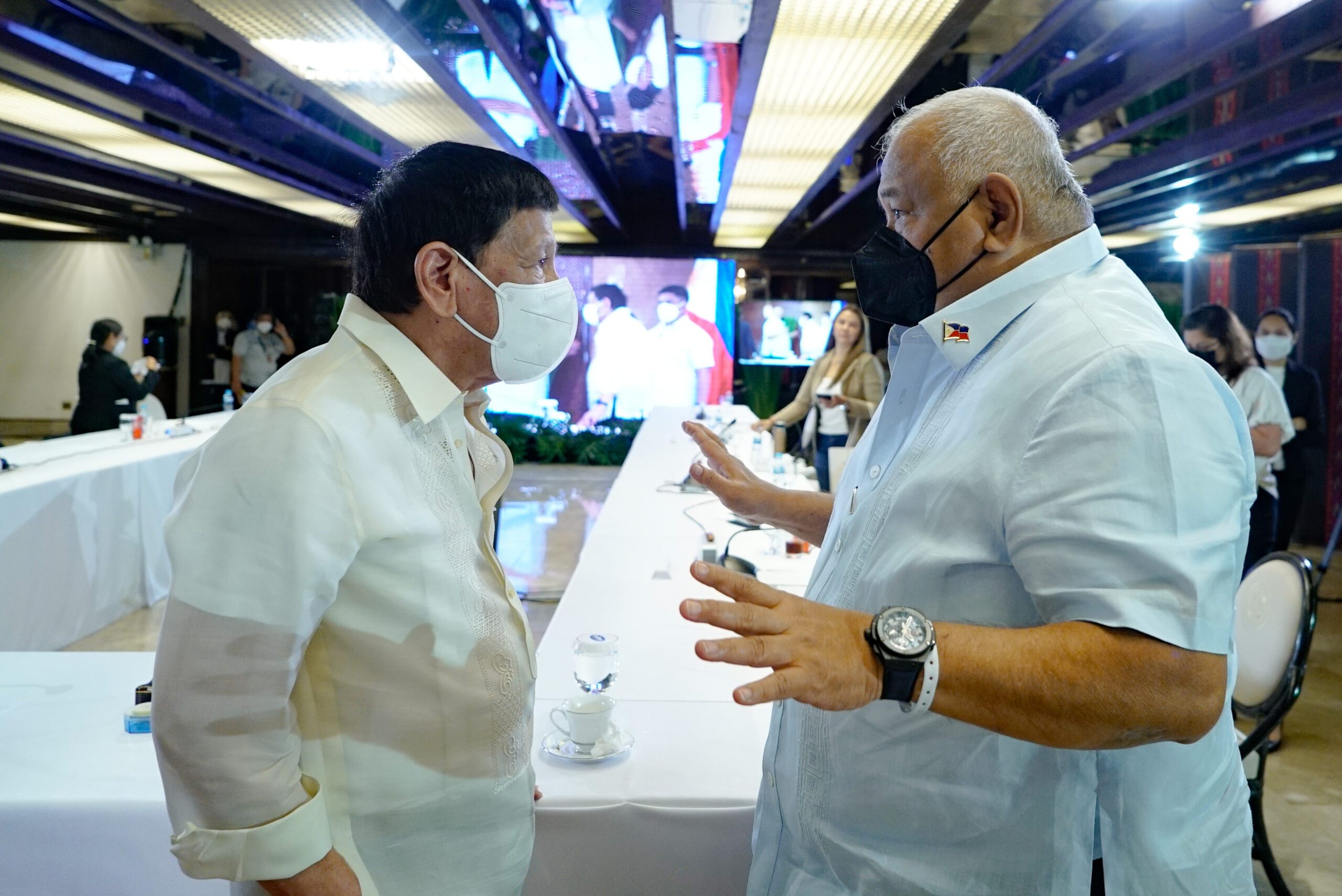
Cabinet members whose portfolio covered these issues hastened to clean up the mess. This was done by issuing press statements that walked back on some of the more extreme aspects of Duterte’s message – the case with Dominguez and Ernesto Pernia after the “US separation” debacle. Or they would quietly meet with the President to recommend changes in approach – like what Executive Secretary Salvador Medialdea did after the President’s threat to abolish the National Food Authority Council.
After Duterte ordered vaccine deniers arrested, his own justice secretary and spokesman had to issue statements clarifying the order requires new legislation. (READ: The many times Duterte and his Cabinet contradicted each other)
But because of his shocking statements, Duterte regularly made headlines. His loud moves attracted a lot of attention to his press conferences, activities, and speeches.
“The President has been almost consistently present in terms of projecting what he was doing. He would be frequently responding to media. Even during the pandemic, you had these weekly appearances…. He presents an image that he is doing his job,” said Pulse Asia’s Holmes when asked in a Rappler Talk interview to explain Duterte’s high ratings.
“Though some people question if he is doing his job, the projection is he is constantly working on fulfilling the functions of the presidency, because he is always on the move and whatever he does is captured by media,” added Holmes.
But this “bang-bang” approach was especially ill-suited to foreign affairs.
As the country’s diplomats filed protest after protest against China’s maritime aggression or got the President to assert the Hague ruling at the United Nations General Assembly, Duterte himself ruined the effect with his off-the-cuff remarks.
For example, the time he likened the Hague ruling to a piece of trash, dangerously echoing China’s foreign ministry.
“I cannot really fathom where he was coming from,” defense chief Lorenzana told Rappler a year later, though he had immediately defended the President’s remarks back then.
“Until now, I am surprised by the things he says sometimes,” Lorenzana added.
Duterte’s tendency to make sensitive statements on air is one reason why his weekly televised addresses, called “Talk to the People,” were edited, according to Palace sources. Chief of protocol Robert Borje, also a presidential assistant on foreign affairs, had been known to request such edits.
Duterte’s messaging style has baffled even foreign officials and led many to see a distinction between canned statements issued by his underlings and the President’s real sentiments and intentions.
It’s a headache, and potential disaster, for the country’s commander in chief and architect of foreign policy to be on a different page from the rest of his government.
Focused on pet issues
Duterte did not govern in general but focused on pet issues, like the drug war, security, basic services, and migrant workers.
If you were a Cabinet member whose portfolio Duterte was not particularly invested in, he left you to your own devices and he would be difficult to reach for decisions.
“That was what was most challenging because he just leaves you, he left me to my own way of doing things. I had to make hard decisions myself without even consulting him,” said Dureza, who had also served the presidencies of Fidel Ramos and Gloria Macapagal Arroyo.

Whenever Dureza felt he needed to directly ask the President for guidance, he was often thwarted by problems with access. Pinning down Duterte for a meeting was always a tricky matter, even, apparently, for a Cabinet official involved in security matters. You had to go through Bong Go or wait for the next Cabinet meeting, which was held only once a month.
“He’s not the type to discuss openly with his officials or members of the Cabinet what his concerns are. We don’t contact him personally, we can’t even call him by phone because he doesn’t give out his phone. You contact only through Bong Go,” said Dureza.
But this style also sometimes made things go faster, because Cabinet members could decide on their own without waiting for meetings. They knew they had a long leash and Duterte was no micro-manager, unlike Benigno Aquino III, who was known to have agonized over Powerpoint presentations.
The long leash applied especially to sectors Duterte admitted he lacked expertise in. He left economic management mainly to Dominguez and the rest of his economic team.
But there were times Duterte would intervene. When the Department of Education proposed pilot face-to-face classes during the pandemic, Duterte rejected the idea thrice, making the Philippines the last country to reopen schools. He has acted against the advice of his economic managers, notably when he signed a law providing free tertiary state education.
He was annoyed when he learned that the Philippine delegation had voted in favor of a probe into war crimes in Israel’s conflict with Palestine in Gaza, a vote that had angered Israel. Duterte had just met with the Israeli ambassador earlier that day and discussed possible COVID-19 assistance.
“Our representative voted without consulting the home government,” an annoyed Duterte told Medialdea.
Stubborn
But when Duterte cared about something, he raised hell, and that often sped things up.
In a 2018 Cabinet meeting when he was told a third telco could not be up and running because frequencies were still with the Pangilinan-led PLDT, Duterte let out a volley of curses and demanded the frequencies be returned to the government at no cost.
“One word from the President, the next morning, it was done,” Rio, the acting Department of Information and Communications Technology secretary then, told Rappler.
On February 6, the day after the Cabinet meeting, tycoon Manny Pangilinan told Rio he would give back the frequencies for free.
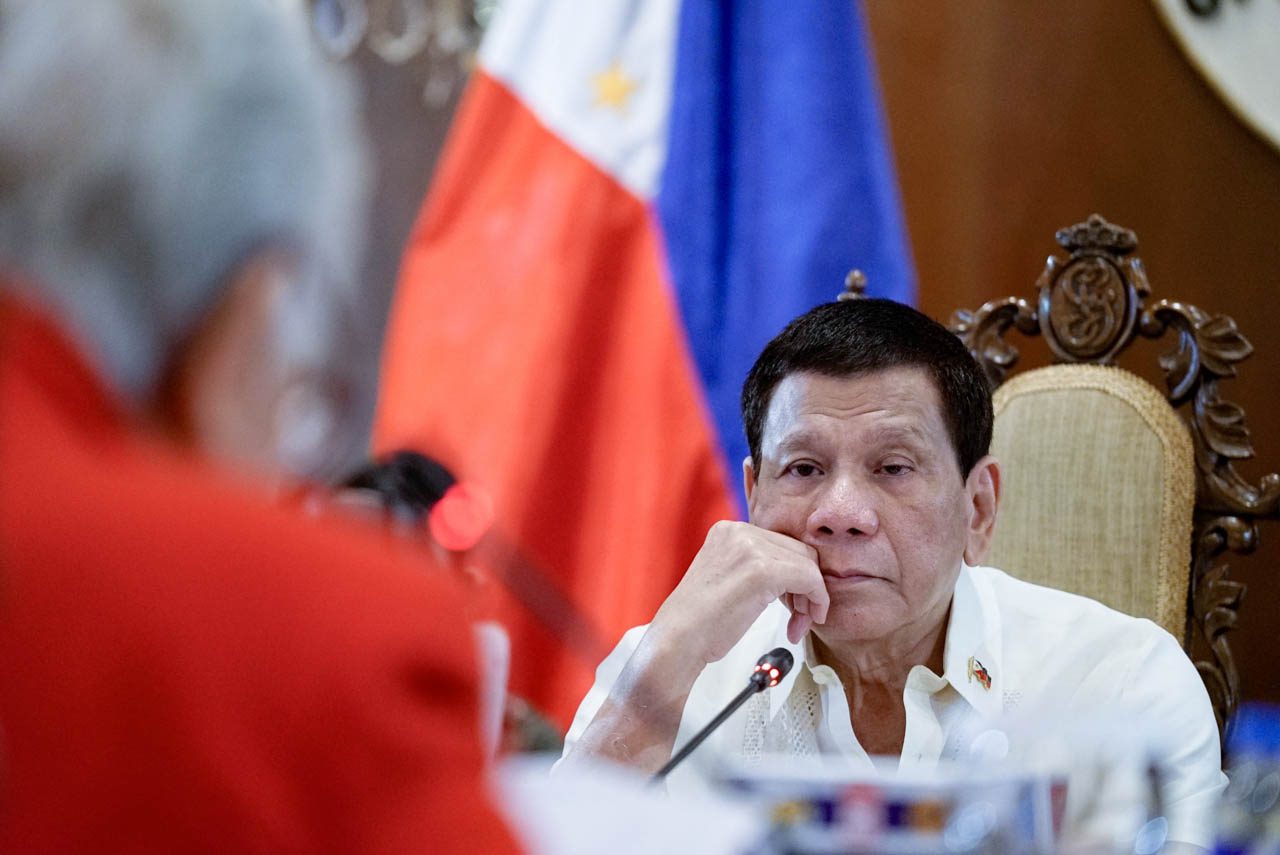
The same stubbornness was on display when Duterte closed down Boracay, badgered Canada to get back their stranded garbage, got Manila Water and Maynilad to sign new concession deals, increased the salary of military and police, and more.
But it was also applied to vendettas that did not serve the public – his constant rants against his “enemies of the day,” repeatedly raised even in meetings or ceremonies that had nothing to do with politics or the communist threat.
He was adamant about withdrawing from the International Criminal Court, spending weeks threatening to slap or arrest its officials. He was bullheaded about voiding the amnesty of opposition figure Antonio Trillanes IV. So determined was he to get back at the US for canceling his first police chief’s visa that he dangled the ultimate bait – the Visiting Forces Agreement.
The zeal with which he targeted critics and fought off perceived threats to his presidency could have been spent on addressing real problems.
Limited bandwidth
Duterte, however, had his limits. An action man who valued bravado over thoroughness, he had little patience for hashing out the intricacies of a problem or going through the nuts and bolts of policy.
For this reason, he heavily relied on experts, like his economic team or the doctors tapped as consultants by his pandemic task force.
The two times Duterte’s Pulse Asia ratings plunged significantly (though still in majority levels) was due to the economy and his administration’s pandemic response. His approval ratings dropped by 13 points (to 75%) in September 2018, amid a surge in rice prices. In September 2021, he got his lowest-ever approval rating, 64%, at a time when Metro Manila was placed under lockdown again and the Senate was investigating the Pharmally contracts.
There were several times Duterte showed his lack of understanding of complex problems, translating to simplistic policies that did more to heighten his public profile than to actually solve the crisis at hand.
For instance, when a 2019 water shortage hit Metro Manila and other Luzon provinces, an angry Duterte’s first order was for Manila Water and Maynilad to “release water” from Angat Dam “good for 150 days.”
A non-plussed Metropolitan Manila Waterworks and Sewerage System administrator could only say Duterte’s order was impossible to implement as there was no such thing as a “150-day water supply.”
The water shortage, experts had tried to say, was a confluence of multiple deep-seated problems: infrastructure deficiencies, red tape, the drier climate.
Many times, Duterte’s lack of a handle on things played out on air, in full public view.
Like the time he confused Benham Rise for the West Philippine Sea, on the other side of the archipelago (National Security Adviser Hermogenes Esperon Jr. quickly arranged a briefing with him after to clarify things). Or when he asked his health secretary, two years into the pandemic, if the COVID-19 virus was airborne.
There was one task force meeting when Duterte, despite being constantly briefed about vaccine delivery timelines, appeared not to understand that jabs could not be administered yet because the first shots were not scheduled to arrive until after a month.
“Sampalin mo na lang! (Just slap them!),” was Duterte’s joke to the head of the Climate Change Commission about how international climate negotiations with wealthy countries should be handled.
He had just railed about how the US abandoned a key global climate treaty, oblivious to the fact that the US had reentered the pact a year ago.
Advisers and subordinates rarely corrected him outright. Dureza said you could contradict Duterte but “in a very nice way.” Medialdea was able to change Duterte’s mind in small meetings. The person able to speak in the most frank manner to Duterte was Dominguez, his high school classmate.
Dominguez, whom Duterte called “Mr. Tsk Tsk Tsk” for his constant finger-wagging at costly government initiatives, had openly criticized the President’s federalism push in a Cabinet meeting. Malacañang staff called Dominguez the “Voice of Reason” in the Cabinet.
With Duterte stepping down, Filipinos may no longer have mornings waking up to presidential threats and cursing, with the incoming president putting on a more sedate and tightly controlled public demeanor.
Everything about Duterte was in the extremes – you either loved him or hated him. To his supporters, he was a president who defied convention to fight for the ordinary Filipino. But he was also a president who damaged democratic guardrails to, at best, speed up “change,” and, at worst, to consolidate power.
It’s a checkered legacy the Philippines will benefit from, and pay dearly for. – Rappler.com
For more in-depth stories, reports, analyses, and videos about Rodrigo Duterte’s presidency, see Rappler’s special coverage page:
Add a comment
How does this make you feel?
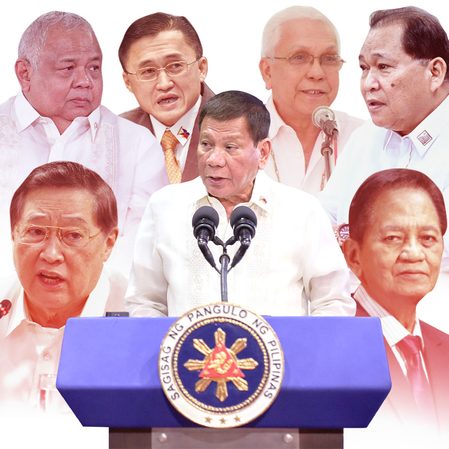
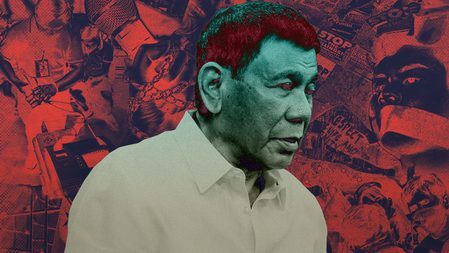



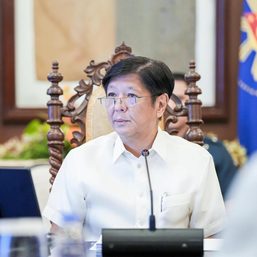
![[WATCH] #TheLeaderIWant: Filipino voters sound off on community issues a year before 2025 elections](https://www.rappler.com/tachyon/2024/05/filipino-voters-sound-off-on-community-issues-1.jpg?resize=257%2C257&crop=276px%2C0px%2C720px%2C720px)
![[OPINION] Rodrigo Duterte and his ‘unconditional love’ for China](https://www.rappler.com/tachyon/2024/04/rodrigo-duterte-xi-jinping-august-2019.jpeg?resize=257%2C257&crop=91px%2C0px%2C900px%2C900px)



![[The Slingshot] Lito Patay’s 4 hours and 38 minutes of infamy](https://www.rappler.com/tachyon/2024/07/Lito-Patay-4-hours-infamy-July-19-2024.jpg?resize=257%2C257&crop=233px%2C0px%2C720px%2C720px)
There are no comments yet. Add your comment to start the conversation.